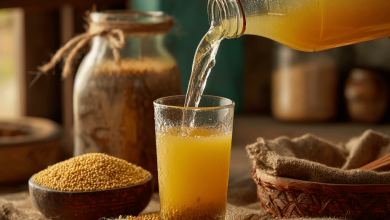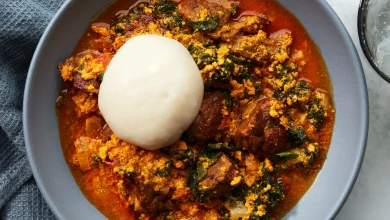Abacha and Ugba Recipe – A Traditional Eastern Nigerian Delight
Welcome to Love With Recipes, where we bring you the most cherished dishes from around the world, infused with love and detailed guidance to help you recreate them perfectly at home. Today, we’re delving into the heart of Eastern Nigeria with a recipe for Abacha and Ugba—a traditional dish that combines the unique textures of cassava fufu and oilbean seeds into a mouthwatering delicacy.
Abacha and Ugba is a classic Nigerian meal made with shredded cassava fufu, popularly known as African Salad, and Ugba, which are fermented oilbean seeds. This dish is both versatile and deeply satisfying, offering a taste of tradition that connects you to the cultural richness of Nigeria’s eastern region.
Ingredients for Abacha and Ugba
| Ingredient | Quantity | Description |
|---|---|---|
| Abacha (Cassava Fufu) | 3 cups | Shredded, soaked, and drained cassava fufu. |
| Ugba (Oilbean Seeds) | 2 cups | Fermented oilbean seeds, cleaned and sliced. |
| Palm Oil | 1/4 cup | Pure and unrefined palm oil. |
| Potash (Akanwu) | 1 tsp | Dissolved in a small amount of water. |
| Ground Crayfish | 2 tbsp | Adds a rich, umami flavor. |
| Ground Pepper | 1 tsp | Adjust to taste for spice. |
| Onion | 1 large | Thinly sliced. |
| Fresh Utazi Leaves | 4-5 leaves | Optional, for garnish and a bitter undertone. |
| Stockfish or Dry Fish | 1 piece | Washed, deboned, and shredded. |
| Seasoning Cubes | 2 cubes | Enhances the overall flavor. |
| Salt | To taste | Balances and enhances the flavors. |
Nutritional Information
| Nutrient | Per Serving | Benefits |
|---|---|---|
| Calories | 250 kcal | Provides energy for daily activities. |
| Protein | 8g | Supports muscle repair and growth. |
| Carbohydrates | 35g | A primary source of energy. |
| Fats | 10g | Offers essential fatty acids. |
| Dietary Fiber | 5g | Aids digestion and promotes gut health. |
| Vitamins (A, C) | Moderate | Boosts immunity and skin health. |
| Iron | 3mg | Supports healthy blood circulation. |
Step-by-Step Instructions
Preparing the Abacha
- Soak the Abacha: Place the shredded cassava fufu in a bowl and soak in lukewarm water for about 10 minutes. This softens it while retaining its chewiness.
- Drain the Water: Pour the soaked Abacha into a sieve to drain out excess water. Set it aside for later.
Preparing the Ugba
- Clean the Ugba: Rinse the fermented oilbean seeds thoroughly in warm water to remove impurities.
- Slice Thinly: If not already sliced, cut the seeds into thin strips for easy mixing and enhanced texture.
Preparing the Sauce
- Activate the Palm Oil: Dissolve potash (Akanwu) in a small amount of water. In a mixing bowl, combine the potash water with palm oil and stir vigorously until the mixture turns thick and orange. This forms the base of the sauce.
- Season the Sauce: Add ground crayfish, ground pepper, sliced onions, and seasoning cubes to the palm oil mixture. Mix well to distribute the flavors evenly.
Assembling the Dish
- Mix the Abacha and Ugba: Gradually fold the soaked Abacha and sliced Ugba into the prepared sauce. Ensure every strand is coated with the rich, flavorful mixture.
- Incorporate Stockfish or Dry Fish: Add the shredded stockfish or dry fish for added flavor and protein. Mix gently to avoid breaking the fish pieces.
- Adjust the Seasoning: Taste the mixture and add salt or more seasoning cubes as needed.
Garnishing and Serving
- Garnish: Arrange fresh utazi leaves on top for a touch of bitterness and aesthetic appeal.
- Serve Warm or Cold: Abacha and Ugba can be enjoyed warm or at room temperature, making it perfect for gatherings or as a quick meal.
Tips for Success
- Perfect Palm Oil Mixture: Ensure your potash is completely dissolved to avoid any grainy texture in the sauce.
- Balance the Flavors: The addition of fresh utazi leaves is optional but recommended for a traditional touch.
- Customize Spice Level: Adjust the amount of ground pepper based on your preference.
Why You’ll Love This Recipe
Abacha and Ugba is not only delicious but also rich in nutrients and steeped in tradition. Whether you’re hosting a cultural event, craving something exotic, or simply exploring the world of Nigerian cuisine, this dish is a must-try. Its affordable ingredients and straightforward preparation make it a delightful addition to your recipe collection.
Explore more traditional recipes from Love With Recipes to bring the world to your kitchen!






